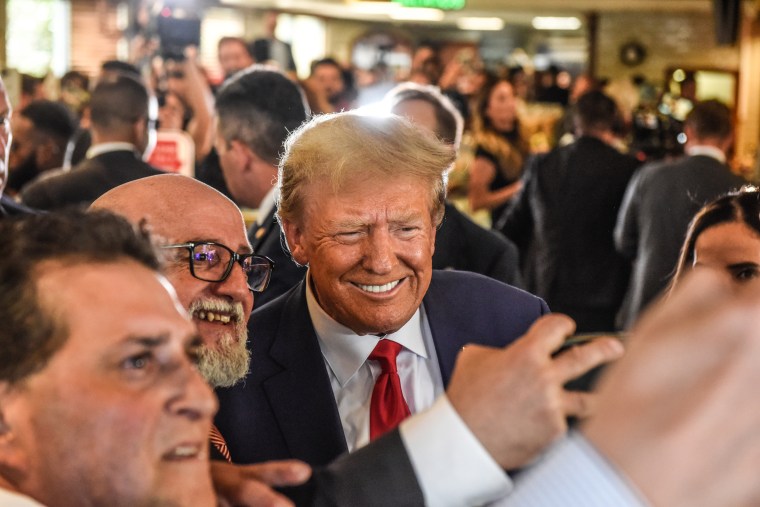MIAMI — Former President Donald Trump’s trip to the city known as the gateway to Latin America served a purpose other than his history-making arraignment in federal court.
It also cemented his yearslong cultivation of the city's Latino voters — even stunning residents who expressed surprise that his first post-indictment official stop was one of the city's most iconic Latino establishments.
The day before Trump’s court appearance, where he became the first former U.S. president to be arraigned on federal crimes, Trump went on a live interview with conservative Spanish-language outlet, Americano Media, to criticize President Joe Biden and Florida Gov. Ron DeSantis, a rival for the 2024 GOP nomination.

After his day in court, where he pleaded not guilty to 37 federal counts related to his alleged mishandling of classified documents, Trump headed to the Cuban restaurant Versailles — a pit stop for presidential candidates for decades, including former Presidents Bill Clinton and George W. Bush — where he was greeted by a cheering crowd.
Supporters sang “Happy Birthday” to Trump, who turned 77 on Wednesday, as he and his team denounced his indictment as politically motivated and compared it to Latin American-style politics and “dictatorships.” He didn't stay for a cafecito but he drew wide cheers.
The choice to turn the day of his federal indictment into a chance to court Latino voters was not surprising. No other U.S. president has dedicated so much time to Latinos in Florida, an ongoing source of frustration for Democrats and anti-Trump Republicans who have been pointing out his consistent outreach for years.
It's worth remembering, as Florida International University political scientist Dario Moreno points out, that Trump did not start with strong support in the country's southernmost big city. Trump’s initial campaign comments slamming Mexicans and his subsequent anti-immigrant rhetoric was seen by many voters as anti-Hispanic.
In the 2016 GOP presidential primaries, Sen. Marco Rubio heavily beat Trump in Miami-Dade, the only Florida county that Trump didn't win. In the 2016 presidential elections, Trump lost in Miami-Dade County to Democratic candidate Hillary Clinton by about 30 points.
But once he became president, Trump spent time in Miami-Dade County and focused heavily on the Cuban American and Venezuelan community and growing groups such as Nicaraguans and Colombians.
“What started out as a constituency that wasn’t behind him and viewed him with suspicion has become, I think, among his most loyal base,” Moreno said.
In 2017, Trump announced the reversal of President Barack Obama’s policy of engagement with Cuba in Little Havana to a crowd of Cuban Americans. This came, Moreno said, amid the perception that Obama's outreach to Cuba and his visit there had not yielded an improvement in human rights in Cuba.
In contrast, Obama, who won the majority of the Cuban American vote in 2012, announced his move to restore diplomatic ties to Cuba from the White House.
Trump dramatically improved his support among Latinos in Florida in the 2020 election and, since then, Republicans have made big gains in all Hispanic groups. When he was re-elected in 2022, DeSantis became the first Republican governor in 20 years to win traditionally blue Miami-Dade County.
Cultivating ties, invoking Latin America
The former president, according to the evidence presented in the indictment, repeatedly flouted the rule of law followed by previous Republican and Democratic presidents regarding classified documents. But Trump and his team have said this new indictment is but a political maneuver as he seeks the 2024 nomination — and they did so Tuesday using rhetoric aimed at his Miami supporters.
Trump attorney and spokesperson Alina Habba said in front of the courthouse that “targeting prosecution of a leading political opponent is the type of thing you see in dictatorships, like Cuba and Venezuela.”
Florida International University political science professor Eduardo Gamarra, who is also director of the Latino Public Opinion Forum at the university, said that while Habba may have drawn comparisons with persecution in Cuba and Venezuela, it's Trump who has “undermined the credibility and trust in institutions.”
A handful of anti-Trump Republicans and Democrats have denounced Trump for disregarding the rule of law as some Latin American leaders have done — comparing Trump to a "caudillo," or strongman.
But that hasn't been effective, Moreno said, among a segment of Latino voters from countries with a history of supporting populist candidates, both from the right, such as former Colombian President Alvaro Uribe, and the left, such as Mexican President Andrés Manuel López Obrador.
In Miami in particular, where more residents have fled leftist countries such as Venezuela, Nicaragua and Cuba, Trump and the Republicans' attacks against "socialist" Democrats have been more effective, Moreno said.
Trump's indictment has brought uncertainty over who will be the GOP nominee, as Republicans at least privately concede. But Trump's Latino outreach, rhetoric and populist approach, according to Moreno, "is something that appealed, especially to first-generation Hispanics in Florida."
And as Trump continues to campaign, "he knows that it works," Gamarra said. "Trump thinks that this is a particularly strong linkage that he has — especially with his base."

